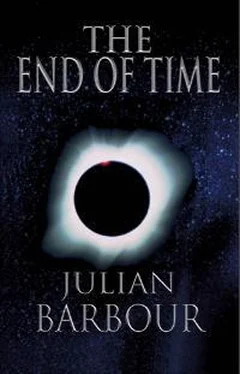boundary conditions 253
‘brachistochrone’ problem 110
brain
damage 33
motion processing 28–30, 267
organization 31–2
state 26
as a time capsule 32–3
Broderick, Damien 358
Broglie, Louis de 189–90, 352
Brout, Robert 352
Brown, Harvey 353
Bruno, Giordano 75
BSW paper 176, 253
bucket experiment 62–3
C
calculus 63
Candide 111
canonical quantization 166
Capelin, Simon 239
Carnap, Rudolf 143
Carter, Brandon 341
causality 312–13
cells 33
centre of mass 79–81
centrifugal force 62–3
Chardin, Teilhard de 328
Christian, Joy 359
chronology of the universe 313–15
Clarke, Samuel 63
Clemence, Gerald 347
Clifton, Andrew 358
clocks 93–108
defined 135
earth’s rotation 106
gravitational effects 154–5
inertial 99–104
solar 97, 98
solar system 106–7
stellar 97, 98
universe as 107–8
water-clock 95
collapse of wave function 199–200, 204, 217–18, 224, 289, 295, 297
College Farm 3, 4
complementarity 204
complex numbers 197
configuration space 43, 208–9
configurations 41, 43, 228
collinear 75
Confucius 17
consciousness 26–8, 31, 52–3
continuum spectrum 235
coordinate grid 129–32, 140–1, 206
Copenhagen interpretation 202–4
Copernicus, Nicolaus 12, 32
correlations 224, 257
cosmology see quantum cosmology
cosmos, well-ordered 322
covariance, general 160, 163–4
creation 22, 64, 110–11, 229, 232–5, 251, 254–6
Creator 326–7
curved surfaces 157–8
extrinsic/intrinsic curvature 158
shortest path on 111–12
cycling 88
D
Davies, Paul 322, 336, 337, 341, 358
Davisson, Clinton 190
Dawkins, Richard 48, 210, 324–5
De Broglie, Louis 189–90
De Chardin, Teilhard 328
degrees of freedom 79
two true 244
Descartes, René
on existence 49–50, 53
on motion 61–2
Deser, Stanley 167
Deutsch, David 333, 337, 352, 358
DeWitt, Bryce 38, 39, 221, 224, 246–7, 257, 351
on many-worlds 224–5
Diana, Princess of Wales, death of 324, 360
Dido, Queen 109–10
difference
intrinsic 116–17, 172
provisional 171–2
diffraction 285
Dirac, Paul 2–3, 13, 15, 40, 167
on mental pictures 206
on self-interference 197
on space-time 2
spinor fields 191
transformation theory 206
Discovery of Dynamics, The 239, 344
discrete spectrum 234
dispersion relation 278
distance 74–5, 147, 150
absolute 74–5
in space-time 147, 150, 151
distinguished simplifier 120, 170–1
Dowker, Fay 353, 354–7, 359
duration 19, 100–3, 107, 123, 133, 136, 173
dynamics 12
E
Earth
as a clock 106
rotation 32, 87
as a time capsule 33
eclipses 98–9
Eddington, Arthur 165
eigenfunctions 234
eigenstates 201, 202
eigenvalues 234–5
eikonal equation 270
Einstein, Albert 11, 134–6, 153
equivalence principle 154
on general covariance 163–4
home in Pavia 114
on Mach 65, 66
Nobel Prize for Physics 187
on Nows 143
on quantum theory 13, 186–7, 188
on real objects 220
relativity theory 12, 15, 129–32, 151–2, 155
on rotating systems 156–7
and space-time 155–6, 159, 160, 161
Einstein-Podolsky-Rosen paradox 218–20
electromagnetism 124–6
electrons 188, 189–90, 191
Eliot, George 330–1
Eliot, T.S. 240
energy 23, 90–2 see also kinetic energy; potential energy
energy levels 188
entangled states 216–17, 222–4
entropy 23–5, 27–8, 289, 318–9
ephemeris time 107
EPR paradox 218–20
equation of time 98
equivalence principle 154, 176–7
eternity 36, 40, 328
Euler, Leonhard 111
events 139, 143
Everett, Hugh 221–7
everything, theory of 192
evolution 252, 256
excited states 234
experience 51–2, 53–4
F
faces 33
falling bodies 93–6
Faraday, Michael 15, 124
Fermat, Pierre de 110
Fermat’s principle 271, 272
Fermi-Dirac statistics 191
fermions 191
Feynman, Richard 244
on time 2
fields 124, 190–1, 222
Fischer, Arthur 344
Fitzgerald, George 128
fossils 33
Foster, Brendan 358
Fourier, Joseph 201
frames of reference 81–2
free will 324–6
Fresnel, Augustin Jean 124, 269
Friedmann, Alexander 317
G
Galileo Galilei 12, 61
falling ball experiment 93–6
odd numbers rule 93–4
parabolic motion 94, 95, 96
on relativity 81–2, 151–2
water-clock of 95
Gamow, George 284
gas 318
Gauss, Carl Friedrich 157–8
Gaussian wave packets 278
general covariance 160, 163–4
geodesics 112, 116–17, 118
geometrical optics 270–1, 288
geometrodynamics 167
geometry, non-Euclidean 157–8
Germer, Lester 190
Gill, Ann 344
Giulini, Domenico 348
God 22, 64, 110–11, 326–7
graffiti describing time 44–5
grand unified theory 192
gravitons 244
gravity 12, 15, 91
curving space-time 12, 159, 160, 161
and time 154–5
Grossman, Marcel 159, 161
ground state 234
group velocity 278
Guichardet, A. 347
Guth, Alan 359
H
haemoglobin 48
Halliwell, Jonathan 258
Hamilton, William Rowan 111, 268, 269–74
Hartle-Hawking wave function 359
Hartle, Jim 353, 354, 359
Hawking, Stephen 39, 258
on Big Bang 320
on black holes 166, 319
on end of physics 13–14
on time travel 329
no-boundary proposal 312
heaven 327–8
Heggie, Douglas 346
Heisenberg, Werner 13, 189, 284
Heisenberg cut 296
Heisenberg’s uncertainty principle 205
Heraclitus 1, 330
Hero of Alexandria 110
Hilbert space 193, 206
Hipparchus 98
history 69, 282–3, 287–92 see also records
Hofmann, Wenzel 115
Holland, Peter 352
Hopkins, Gerard Manley 75, 323
Hoyle, Fred 359
human body as a time capsule 33
Hut, Piet 346
hyperplanes 143–4
I
identity of indiscernibles 85–6
inertia 62, 65, 93
inertial clock 99–104
inertial frame of reference 82
inflation 359
initial conditions 22, 253
instants of time 16, 18, 247, 265–6
interactions 104–5
interference 124, 125, 195–6
self- 197
fringes 196
intrinsic difference 116–17, 172
intrinsic time 245
invariable plane 88
ionization 284–7, 290–6
Isham, Christopher 351
J
James, William 28
K
Kant, Immanuel 207
Kaon decay 342
Keats, John 326, 331
Kepler, Johannes 2, 12, 98, 164, 269
Kiefer, Claus 352, 353
kinematic relativity 152
kinetic energy 90, 108, 112
Klein-Gordon equation 351
Kretschmann, Erich 164
Kubasiak, Gretchen Mills 334, 338–40
Kuchař, Karel 172–3, 238–9, 246, 349, 351
Kuhn, Thomas 115
L
LaFlamme, Raymond 358
Lagrange, Joseph-Louis de 111
Lanczos, Cornelius 268–9
Читать дальше












